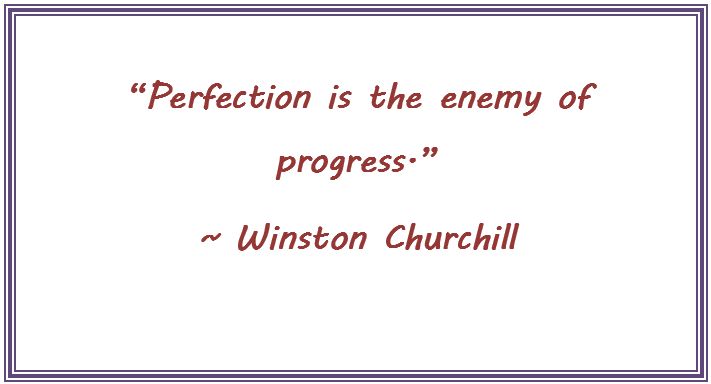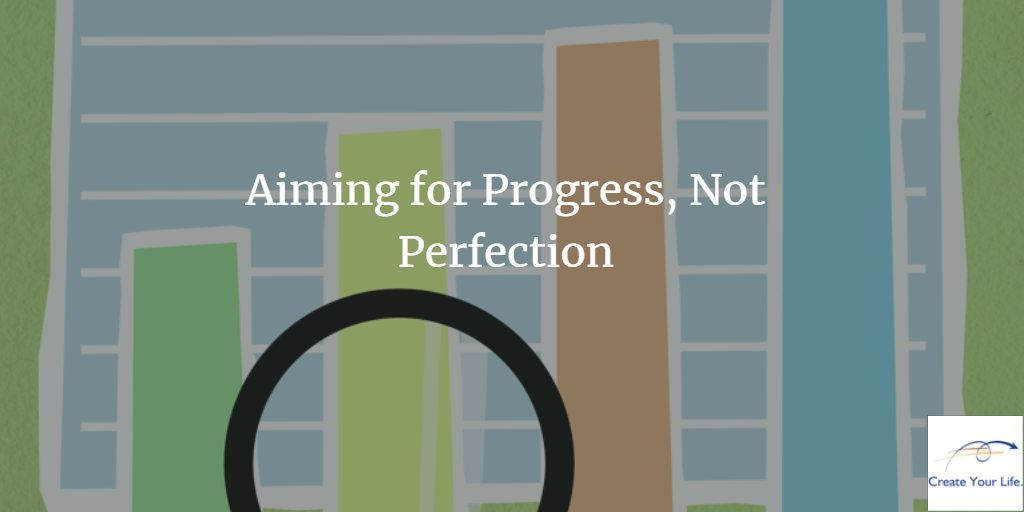Don’t let a desire to be perfect hold you back from reaching your true desires. Perfectionism can keep you from reaching your full potential Remember, you’re aiming for progress, not perfection.
Making Progress or Being Perfect?
This is a story about two friends, Jack and Jill. Both feel like they are out of shape and want to get in the habit of working out, maybe lose a little weight. They each set a goal to work out for one hour a day, four days a week. However, they took different approaches to work on this goal. Let’s take a look.
Jack works hard the first day – thirty minutes of aerobic activity and thirty minutes of weight training. On his second day, he’s a little sore but still gets in his full workout. On the third day, he’s a lot sore, and manages to do his walking but only part of the weight training. By the fourth day, Jack is so stiff and sore, he can hardly move, let alone do a workout. He decides to take a week off. When the next week rolls around, Jack makes a half-hearted attempt to do his workout, but he’s mostly lost interest in this goal. After that failed attempt, he soon forgets about getting to the gym. Occasionally, he thinks “I really should start working out again”, but that’s as far as he goes.
Jill’s approach to her goal is much different. She sets a “floor” or baseline of a 10-minute walk. Her ceiling is a full 60 minutes of aerobic activity and weight training, but she only has to reach her baseline to get credit for a workout for that day. Even then, she starts slowly, adding a few minutes to her workout each time. She continues in this way over several weeks, improving her performance and, at a minimum reaching her baseline, but more often than not continuing to do her full workout.

See the difference? Jack was going for “perfection”. He decided that he must do a full workout to get any benefit, never considering the fact that he needed to slowly work up to a 60-minute workout and, even then on some days, he just couldn’t do that. And he quickly gave up on his goal when he couldn’t be perfect.
Jill aimed for progress, not perfection. She knew she couldn’t do a full workout every time but didn’t let that deter her. She focused on what she could do and gradually got better and better. Eventually, the workouts became a habit and, the last time I checked, she was still going strong — and getting stronger.
Is Perfection Holding You Back?
Like Jack, I struggled with being a perfectionist for years, especially when I was younger. I most definitely had a fixed mindset, believing I should know how to do something flawlessly the first time I tried it. Now, you and I both know (now) that this is a foolish idea, but it held me back for years. I tried very little, I was easily discouraged and embarrassed by my “failures”. I found it easier to hold that image of perfection for myself if I didn’t actually let reality in.
An underlying emotion of perfection is fear – fear of failure, fear of looking foolish, fear of losing our good opinion of ourselves. As Joshua Becker writes, “So many people would rather be disappointed and unfulfilled doing things that are safe than go through the anxiety of chasing valuable dreams and goals. Sadly, they prefer a safe, meaningless status quo over taking a risk that might lead to failure – or might lead to success.” [Becker]
And it has become pretty obvious to me that fear, or perfectionism, or whatever you want to call it, can keep us from reaching our full potential. Thankfully, over time I’ve learned that instead of fearing failure, we have to embrace it as the teacher it is. As Og Mandino said, “I must fail often to succeed only once.” [Mandino]
Making Progress (Not Perfection)
You and I want to aim for progress, not perfection. In the same way that Jill approached her goal of working out, we need to take small steps, be consistent and persistent, knowing there will be failures, setbacks, and obstacles that we’ll contend with on the way, but making progress all along.
If we want to make progress on our BIG (Bold-Important-Gratifying) goals, we must (1) have a BIG goal, and (2) let go of the idea of having it perfect.
Goal setting focuses your attention and is one of the “happiness tools” that leads to increased positivity. Without a goal, you are apt to drift from activity to activity, never really feeling like you accomplished much of anything.
But as we have seen, wanting the goal is not enough. You must approach it with a plan for how you will reach it. And you must be prepared to change your plan when (not if) your efforts fail. Have a plan B, a plan C, a plan D – have as many plans as you need so you can continue making progress, tiny step by tiny step. Approach your goal achievement as Jill did.
Perfection Isn’t Always the Bad Guy
But let’s keep in mind that perfection isn’t necessarily the bad guy. Look at what a couple of the winningest coaches have to say on the subject of perfection:
“Perfection is not attainable, but if we chase perfection we can catch excellence.” ~ Vince Lombardi
“Perfection is what you are striving for, but perfection is an impossibility. However, striving for perfection is not an impossibility. Do the best you can under the conditions that exist. That is what counts.” ~ John Wooden
So while we’ll never achieve perfection, aiming to do the very best we can do will allow us to be the best we can be. Aim for perfection and you’ll hit excellence.
As you reach for excellence and not perfection, understand and use the law of diminishing returns. Realize that not everything has to be 100%. Many things are fine at 95%, 90%, even 80% or 70%. Will it be worth the extra time it takes to get that last 5 – 10% perfect? Don’t spend time doing things that nobody values.

How To Make Progress
As you aim for progress and not perfection, ask yourself periodically throughout the day: “What’s important now?” [Phelps] When you get up – what’s important now? After you complete your morning routine – what’s important now? When you start work – what’s important now? As you complete each task – what’s important now? When you get home – what’s important now? Get the idea? By focusing on “what’s important now?”, you’ll be guaranteed to make progress toward your BIG goal.
To help you know what’s important right now, it helps to identify your MITs – your Most Important Things [Womack] for a specific period: this morning, before lunch, before I go home, or whatever is appropriate for you at the time. Then follow this 3-step process as defined by Jason Womack in Your Best Just Got Better: Set a goal, be consistent in doing the next step (what’s important now?), and take immediate action. [Womack]
When you set a series of small – but challenging and important – goals or steps, your motivation to continue taking steps toward your goal increases. You are in a “success spiral”. [Steel] Each victory gives you “a new sense of self and a desire to strive for more.” [Steel]
To ensure you continue to make progress, compare your “what’s important now” steps for what you want to do against whatever is really taking up your energy, time, and attention. If you find you’re not focused on those things that you say are important, step back and reexamine your priorities. To refocus on your important tasks and activities, try this technique suggested by Jason Womack. State each of your MITs, then follow it with a “so that” phrase. [Womack] “I’ll call my customer who lodged a complaint so that I can find a resolution and astonish her with our customer support.” “I’ll do my baseline workout, and more if I can so that I can be in fantastic physical shape.”
Remember, you’re aiming for progress, not perfection.
What Do I Do Now?
As you look for ways to apply this knowledge, remember the importance of practice. Goals are important, says Jim Rohn, but they exist mainly in the future. “Practice,” Rohn goes on to say, “the path of mastery, exists only in the present.” [Rohn] Once you have your goals in place, determine the steps, or practices, that you’ll take day by day to make progress.
When setting your goals, keep these things in mind.
- Be sure your goal is specific, so you’ll know exactly when you achieve it. Instead of having a vague goal (“spend more time with my kids”), set a specific one (“play board games with my kids every Sunday”). [Korb]
- Break long-term goals into short-term steps. I start each year with a BIG yearly goal. I break that down into twelve monthly goals. Each week, I set a weekly goal that is a step to the monthly goal. And every day, I have one small step that I can do that day to achieve my weekly goal.
- Design a series of steps for reaching your BIG goal that you can turn into routine and make a habit. Automate your best behaviors and your goals will become easier to achieve. [Steel]
You can read much more about Excelerated Goal Setting™ in the Excelerated Life™ archives.
Progress, Not Perfection
Don’t let a desire to be perfect hold you back from reaching your true desires. As one of my teachers and mentors, Brian Johnson, is fond of saying: “There are no perfect human beings. And you and I? We’re not going to be the first.”
Start with a BIG goal and break it into small steps which you can practice every day. Have a baseline, a minimum amount you will do each day, and do more on those days you can. Keep a list of your MITs – your Most Important Things. Then, before you mindlessly begin on a task, remember to ask yourself: What’s important now? This helps you focus on the things that matter to you.
And remember that, while we’ll never achieve perfection, doing the very best we can do allows us to be the best we can be. Aim for perfection and you’ll hit excellence. That is embracing your Excelerated Life™!
What’s your BIG goal?
What small step could you take today to make progress toward it?
Share your thoughts by leaving a comment below.
Excelerated Goal Setting™ — planning and achieving BIG (Bold, Important, Gratifying) goals — is one step in creating your Excelerated Life™, a life of flourishing and well-being, and a life of meaning, purpose, and service.
Read more about the Excelerated Life™.
Resources:
Becker, Joshua. Things That Matter. New York: WaterBrook, an imprint of Random House, a division of Penguin Random House LLC, 2022.
Korb, PhD, Alex. The Upward Spiral: Using Neuroscience To Reverse The Course Of Depression, One Small Change At A Time. Oakland, CA: New Harbinger Publications, Ind., 2015.
Mandino, Og. The Greatest Secret in the World. New York: Bantam Books, 1978.
Phelps, Michael with Alan Abrahamson. No Limits: The Will To Succeed. New York: Free Press, 2008.
Rohn, Jim. Leading an Inspired Life. Niles, IL: Nightingale-Conant Corporation, 1997.
Steel, PhD, Piers. The Procrastination Equation: How To Stop Putting Things Off And Start Getting Things Done. New York: HarperCollins Publishers, 2011.
Womack, Jason W. Your Best Just Got Better: Work Smarter, Think Bigger, Achieve More. Hoboken, NJ: John Wiley & Sons, Inc., 2012.


